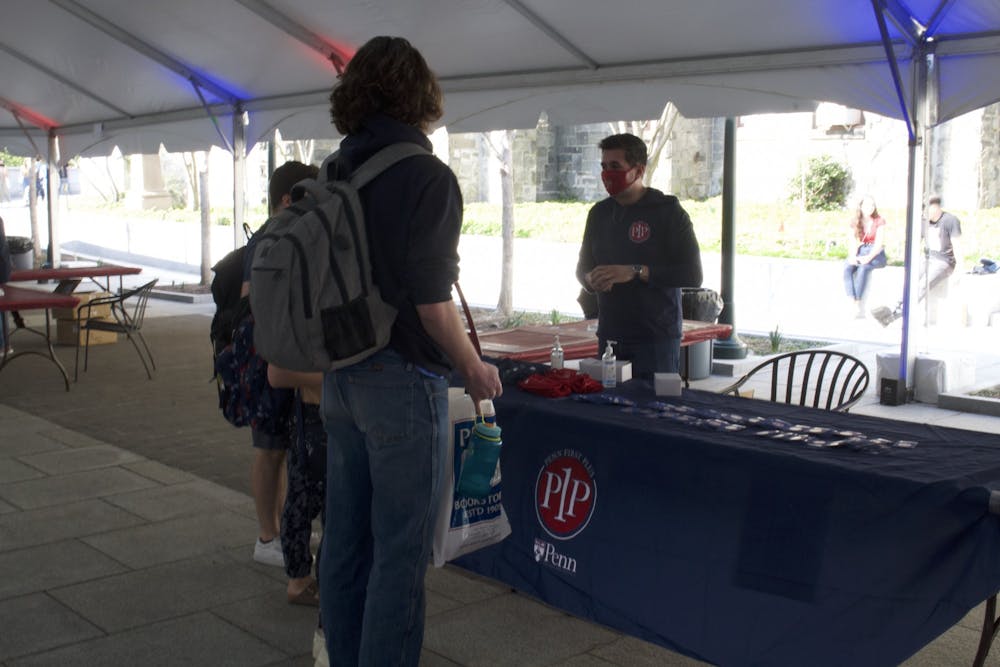
Many first-generation, low-income first years and sophomores are excited to be on campus for the first time, but some expressed concerns about adjusting to life at Penn.
Finally taking their first steps onto Penn’s campus was a welcome change for many FGLI students after a mostly virtual conclusion to high school, and for sophomores, a remote beginning to their college years.
College first year Andrea Barajas, who identifies as a FGLI student, said she was excited to be able to go to college in person after her entire senior year of high school was held online.
“The moment I stepped on campus, I was like, 'I know I'm supposed to be here.' I really do feel like I'm going to be able to grow and develop the experiences that I missed out on in high school,” Barajas said.
Some FGLI first years reported feeling pleasantly surprised by Penn's existing FGLI community and resources such as the Penn First Plus office and various FGLI student organizations on campus. Barajas said she has been excited to meet and make friends with other students, particularly those who also identify as FGLI.
About 15% of the 3,404 and 3,202 applicants admitted to the Class of 2024 and Class of 2025, respectively, identify as FGLI students.
“It just surprises me how many people identify as FGLI as well, because when I find out that they also identify as FGLI, it's like, ‘Oh my gosh! Hey! We have something in common,'" Barajas said. "We're defying expectations together."
Despite having been on campus for just a month, some FGLI students have already taken on jobs at Penn, including work-study opportunities, to support themselves and their families. Barajas said that she currently works a job tutoring students remotely to help her family pay rent and to save up for expenses during the school year. She also hopes to get a work-study position at La Casa Latina, the cultural center for Penn's Latinx community.
College first year Kathleen Hoang said she also quickly found two work-study jobs on campus, adding that her family’s situation necessitated that she find employment as soon as possible. While juggling two jobs on top of her schoolwork, she said it feels difficult to relate to wealthier peers who do not need to take on jobs.
“A lot of [students] are a lot wealthier than me, and I'm here on a QuestBridge scholarship, so I can't really fathom that amount of wealth. I'm working two work studies right now to support myself and my family back home, so it's really different talking to someone who is given allowances from their parents,” Hoang said.
QuestBridge connects low-income students with top colleges.
For some FGLI students, coming to Penn was a jarring culture shock. Hoang said her high school and home community were entirely different to Penn's demographics.
“I went to school with majority minority [students] — we were all black and brown students — and I knew few white people,” Hoang said. “I knew I was going to go to a [predominantly white institution], but then seeing that I was at a PWI was completely different when I came onto campus three weeks ago. It's absolutely jarring and it also breaks my heart because a part of me feels like I left behind my community.”
Some FGLI students added that they are worried about sicknesses going around on campus — COVID-19 and otherwise — because they do not want to infect themselves or their families. Hoang said that she was worried about the amount of people coughing in many of her in-person classes.
“Hearing everyone coughing in lectures was super scary,” Hoang said. “I'm also immunocompromised, so it's terrifying to me that I can get sick, and then I go home in a few weeks, and I'm scared that I’m going to bring it to my grandparents that I live with.”
Students also said that while they appreciated the in-person semester so far, they hope that professors and club leaders will consider keeping some virtual options open considering concerns about COVID-19. College sophomore Alexander Lee, who identifies as a FGLI student, said that he missed having recorded lectures and club meetings widely available online.
“I think online meetings — especially [general body meetings] — are helpful because a lot of those you can look at the same content online,” Lee said. “I really enjoyed last semester where we could re-watch lectures. In the classroom, recorded lectures are really helpful.”
Barajas said now that she's on campus, she appreciates the opportunity to find a community of friends and peers with similar experiences and backgrounds.
“When you're a FGLI student in particular, it becomes very easy to compare yourself to people who have had way more resources in their life and that can lead to a very negative impact on your mental health,” Barajas said. “It's nice to be around people who have similar backgrounds so that you feel supported, especially because there is a more difficult transition for FGLI students in college.”
The Daily Pennsylvanian is an independent, student-run newspaper. Please consider making a donation to support the coverage that shapes the University. Your generosity ensures a future of strong journalism at Penn.
Donate







